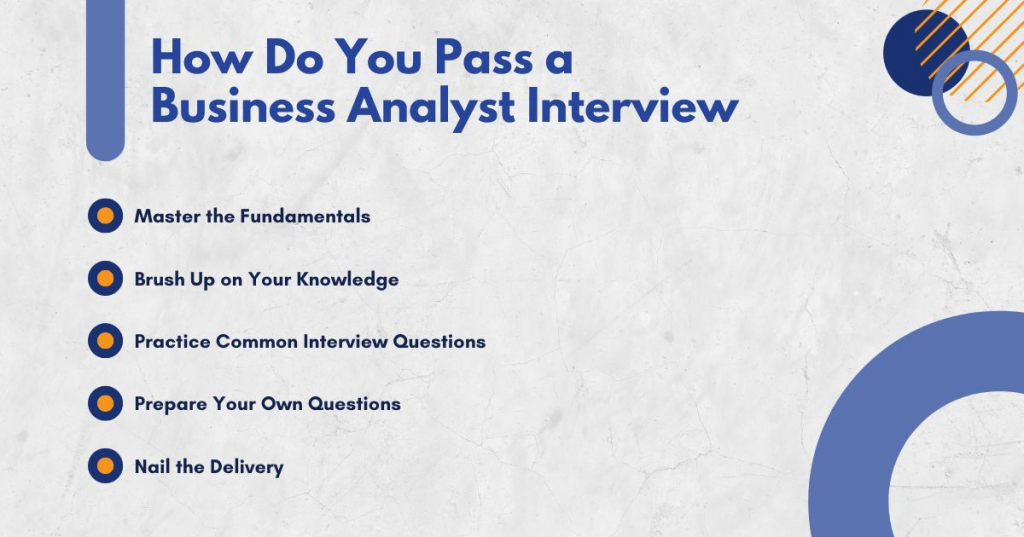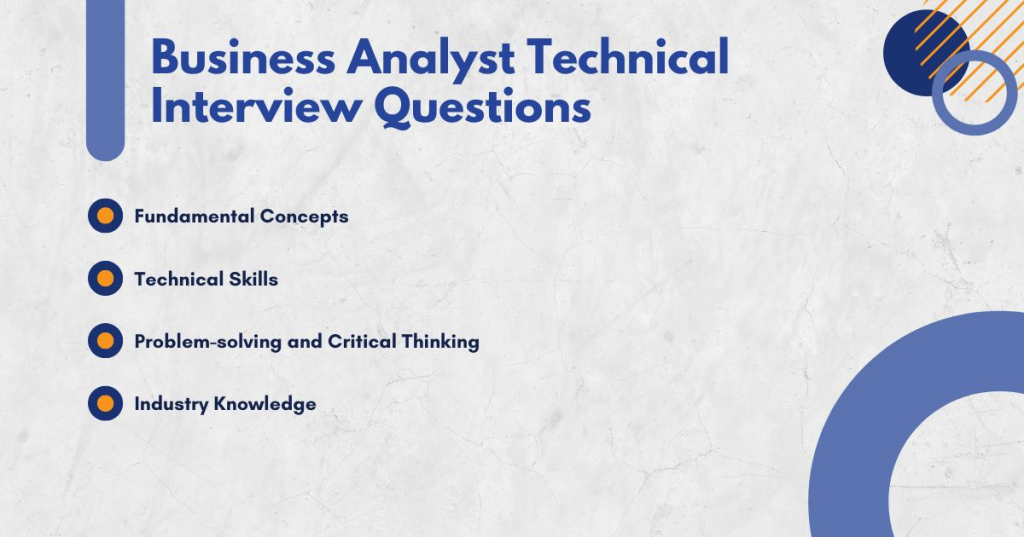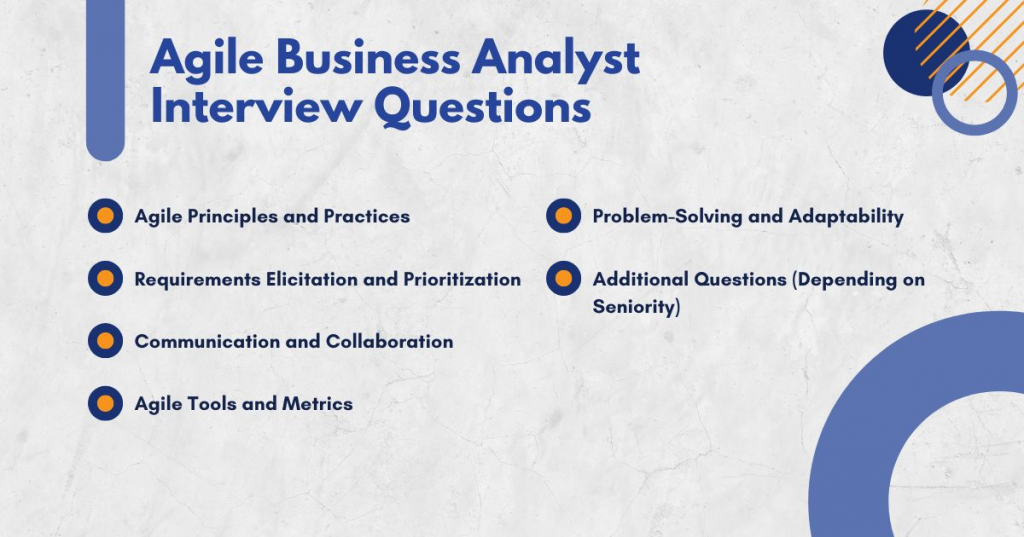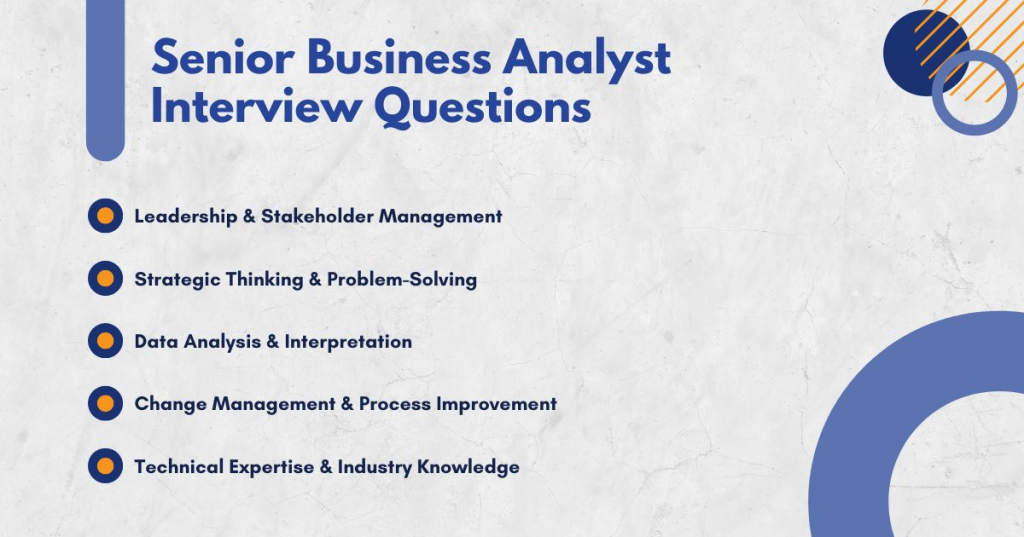Business Analyst Interview Questions & Tips To Pass
Are you preparing for a Business Analyst interview? This guide from SkillTrans provides a comprehensive set of questions you may encounter, covering technical skills, problem-solving abilities, and industry knowledge.
Join us for insider tips to ace your interview and achieve your goals in this article.
How Do You Pass a Business Analyst Interview?

Landing a business analyst role takes more than just skills – it requires a strategic approach to the interview process. Here's your comprehensive guide to acing your next BA interview:
Master the Fundamentals
Basic knowledge is the premise for more in-depth skills and knowledge to develop. A person with a solid foundation of basic knowledge will be able to do things correctly and more effectively than someone without.
Before attending the interview as a Business Analyst candidate. Consider:
Know the Business Analyst Role Inside Out: Understand the core responsibilities, required skills, and the value a BA brings to an organization.
Research the Company Thoroughly: Dive into their mission, values, industry, products/services, and recent news. Tailor your answers to show alignment with their goals.
Review the Job Description Carefully: Identify the key qualifications and tailor your responses to highlight your relevant experience.
Brush Up on Your Knowledge
Specialized knowledge is especially important, especially for positions that require the use of specialized knowledge and analytical tools to work such as Business Analyst.
To increase the success rate in the interview. Try to improve your specialized knowledge by:
Business Analysis Methodologies: Be ready to discuss Agile, Waterfall, SDLC, or any methodologies relevant to the company's practices.
Data Analysis and Tools: Demonstrate your proficiency with SQL, Excel, data visualization tools (e.g., Tableau, Power BI), or other relevant software.
Industry-Specific Knowledge: If the role is in a specific domain (e.g., healthcare, finance), showcase your understanding of that industry's unique challenges and trends.
Practice Common Interview Questions
Preparing answers to interview questions is very important, it not only helps you answer better but can help you fill in any gaps in knowledge before the interview.
Consider preparing interview questions as suggested by SkillTrans:
Behavioral Questions: Prepare examples from your past experiences that demonstrate your problem-solving, analytical, and communication skills.
Technical Questions: Be ready for questions about your experience with data analysis, process modeling, requirements gathering, and stakeholder management.
Case Studies: Practice working through hypothetical scenarios to showcase your ability to think critically and apply BA principles.
Prepare Your Own Questions
Preparing questions to ask the employer is extremely necessary. Prioritize the questions you want to ask, maybe about the working environment or job benefits.
A clear understanding of your fit with a company and the job requirements can increase your drive to apply. Consider:
Show Your Interest: Ask insightful questions about the company's projects, team culture, or challenges they're facing.
Assess Fit: Use your questions to determine if the role and the company are the right match for your career goals.
Nail the Delivery
Ultimately, an interview is a pivotal opportunity to change the trajectory of your life and career. Given its significance, give your best in every aspect. Consider the following:
Communicate Clearly and Confidently: Articulate your thoughts in a structured manner, using clear and concise language.
Active Listening: Pay close attention to the interviewer's questions and respond thoughtfully.
Enthusiasm and Passion: Show your genuine interest in the role and the company.
Professionalism: Dress appropriately, arrive on time, and maintain a positive attitude throughout the interview.
Business Analyst Technical Interview Questions

Here are 20 technical interview questions you might encounter in a Business Analyst interview:
Fundamental Concepts
Questions about basic technical knowledge for Business Analysts:
What are the key phases of the Software Development Life Cycle (SDLC), and what is the business analyst's role in each?
Explain the difference between functional and non-functional requirements, and provide examples.
Describe your experience with different requirement elicitation techniques (e.g., interviews, workshops, surveys). Which do you find most effective and why?
How do you prioritize conflicting stakeholder requirements? Describe a situation where you had to manage such conflicts.
What are the different types of diagrams used in business analysis (e.g., use case, process flow, data flow)? When would you use each?
Technical Skills
Questions that are more technical skills give, a better understanding of the candidate's abilities:
What experience do you have with SQL queries? Can you provide an example of a query you've written?
Are you familiar with data modeling concepts? Explain the differences between conceptual, logical, and physical data models.
Have you used any data visualization tools (e.g., Tableau, Power BI)? Describe a time when you used data visualization to communicate insights effectively.
What experience do you have with programming languages or scripting (e.g., Python, R)? How has this knowledge benefited your work as a business analyst?
How do you ensure the quality of requirements and validate that they meet the needs of stakeholders?
Problem-solving and Critical Thinking
Questions about the ability to handle situations and solve problems at work:
Describe a challenging technical problem you encountered on a project. How did you approach it, and what was the outcome?
How would you handle a situation where a project's scope begins to creep? What steps would you take to mitigate the impact?
You discover a major flaw in a requirement after it's been implemented. How would you address this issue with stakeholders and the development team?
How do you measure the success of a project or a specific requirement? What metrics or KPIs do you track?
If you had to choose between two promising solutions, but only had resources to implement one, how would you make the decision?
Industry Knowledge
These interview questions assess a senior business analyst's knowledge of industry-specific regulations, emerging technologies, Agile methodologies, and their ability to drive efficiency and cost reduction in projects:
Are you familiar with any industry-specific regulations or standards that impact business analysis (e.g., HIPAA for healthcare, GDPR for data privacy)?
What emerging technologies are you most excited about, and how do you see them impacting the field of business analysis?
How do you stay current with the latest trends and best practices in business analysis?
Have you worked in an Agile environment? Describe your experience with Agile methodologies and how they influenced your approach to business analysis.
Can you share an example of a project where you played a key role in improving efficiency or reducing costs for a company?
Agile Business Analyst Interview Questions

Here are 20 Agile Business Analyst interview questions, focusing on the skills and knowledge needed in Agile environments:
Agile Principles and Practices
These questions focus on Agile methodology interview questions. It explores the core principles of Agile, the role of a Business Analyst in Agile teams, key ceremonies, user story writing, and estimation techniques:
Describe the key principles and values of Agile development. How do they differ from traditional project management approaches?
Explain the roles and responsibilities of a Business Analyst in an Agile team. How do you collaborate with the Product Owner, Developers, and QA?
What are the Agile ceremonies (e.g., sprint planning, daily stand-ups, retrospectives)? Explain your role in each.
How do you write user stories? What are the key characteristics of a good user story?
What is your experience with Agile estimation techniques (e.g., story points, planning poker)?
Requirements Elicitation and Prioritization
These questions focus on how an Agile Business Analyst gathers, documents, prioritizes, and manages evolving requirements throughout a project:
How do you gather and document requirements in an Agile environment? What techniques do you use (e.g., user story mapping, backlog grooming)?
How do you prioritize user stories or features in the product backlog? What factors do you consider?
How do you manage changing requirements during a sprint? How do you communicate these changes to the team?
Communication and Collaboration
These questions assess your ability to effectively communicate technical information to non-technical audiences, build relationships with diverse stakeholders, foster collaboration within Agile teams, and navigate conflict resolution:
How do you communicate complex technical concepts or requirements to non-technical stakeholders?
How do you build and maintain relationships with stakeholders who have different perspectives and priorities?
How do you facilitate communication and collaboration within an Agile team?
Describe a situation where you had to resolve a conflict or disagreement within an Agile team.
Agile Tools and Metrics
These questions focus on the candidate's familiarity with Agile tools and metrics. It asked about the specific tools they used for project management and task tracking:
What Agile project management tools have you used (e.g., Jira, Trello, Asana)? How have you used them to track progress, manage tasks, and report to stakeholders?
What Agile metrics do you track (e.g., velocity, burn-down charts)? How do you use these metrics to assess team performance and identify areas for improvement?
Problem-Solving and Adaptability
These questions assess the candidate's ability to handle obstacles and adapt to various Agile situations:
Describe a time when you faced a major challenge or setback in an Agile project. How did you overcome it?
How do you adapt your approach when working with teams or stakeholders who are new to Agile?
How do you handle ambiguity or uncertainty in requirements? How do you ensure the team delivers value despite these challenges?
Additional Questions (Depending on Seniority)
These questions assess a senior business analyst's ability to guide junior team members, expand Agile methodologies to larger contexts, and seamlessly integrate Agile practices:
How would you coach or mentor a junior Business Analyst in Agile practices?
How would you approach scaling Agile to larger projects or organizations?
How do you ensure that Agile practices are integrated with other organizational processes (e.g., budgeting, resource allocation)?
Senior Business Analyst Interview Questions

Here are 20 senior business analyst interview questions, focusing on leadership, strategy, and complex problem-solving:
Leadership & Stakeholder Management
These questions focus on a senior business analyst's experience in leading teams, managing stakeholders with conflicting interests, influencing senior management, and mentoring junior analysts:
Describe a time when you led a cross-functional team through a complex project. What challenges did you face, and how did you ensure successful collaboration?
How do you build trust and rapport with stakeholders who have conflicting interests?
How do you approach influencing senior management or executives to gain buy-in for your recommendations?
Share an example of how you mentored or coached a junior business analyst. What were the results?
Strategic Thinking & Problem-Solving
How do you identify and prioritize strategic initiatives that align with the company's overall goals?
Describe a time when you faced a significant roadblock in a project. How did you analyze the situation, develop solutions, and ultimately resolve the issue?
How do you assess the impact of technology trends on a business and its operations?
What techniques do you use to facilitate group brainstorming sessions and decision-making processes?
Data Analysis & Interpretation
The questions focus on how an Agile Business Analyst leverages data analysis to uncover business opportunities/risks, selects reliable data sources, ensures data accuracy, and combines quantitative data with qualitative insights for decision-making:
Explain a situation where you utilized data analysis to identify a significant business opportunity or risk. How did you present your findings to stakeholders?
How do you determine which data sources are most reliable and relevant for a given analysis?
How do you ensure the accuracy and validity of your data analysis findings?
How do you balance quantitative data with qualitative insights to make informed recommendations?
Change Management & Process Improvement
Describe a time when you successfully led a change management initiative. How did you address resistance, communicate effectively, and ensure a smooth transition?
How do you measure the success of a process improvement initiative? What metrics would you use, and how would you track progress?
What strategies do you use to identify and address root causes of problems, rather than just treating symptoms?
How do you ensure that process improvements are sustainable and continue to deliver value over time?
Technical Expertise & Industry Knowledge
These questions assess the candidate's knowledge of relevant technologies and industry trends, their ability to choose the right tech solutions, their adaptability to new technical skills, and their communication skills for explaining technical topics to non-technical stakeholders:
What are the most important emerging technologies or trends in your industry? How do you stay current with these developments?
How do you approach evaluating and selecting the right technology solutions for a given business problem?
Describe a time when you had to quickly learn and apply a new technical skill or concept on the job.
How do you adapt your communication style when explaining technical concepts to non-technical audiences?
Conclusion
In this article, we have provided you with ways to prepare before the interview to increase your success rate in the interview for the Business Analyst position. We also provide more than 50 questions closely related to the title and job of Business Analyst so you can prepare as best as possible for the interview. We hope you are satisfied with the content we provide.
Additionally, for those keen on learning Business analysis, SkillTrans offers a range of free and premium online courses. Explore our Online Learning Catalog to enhance your skills as a Business Analyst before your interview!

Meet Hoang Duyen, an experienced SEO Specialist with a proven track record in driving organic growth and boosting online visibility. She has honed her skills in keyword research, on-page optimization, and technical SEO. Her expertise lies in crafting data-driven strategies that not only improve search engine rankings but also deliver tangible results for businesses.



